The incredible benefits of buckwheat husks in the garden
Buckwheat husk is a valuable material for growing plants. It is inexpensive, but the results of its use are impressive even for experienced gardeners. The properties of husk make it a versatile tool for accelerating the growth and development of crops, increasing yields and reducing the cost of manual labor.
The content of the article
Useful properties of buckwheat husks
Buckwheat husk, or husk, is buckwheat waste that is formed after processing at cereal factories. These are hollow, light shells of buckwheat grains. They are dark brown in color and have a pronounced specific buckwheat smell.
In the photo - buckwheat husk.
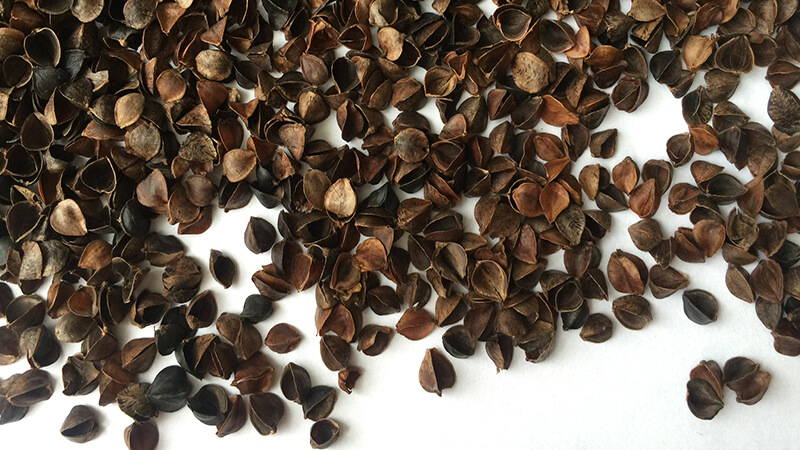
The use of husk in agriculture is explained by its valuable properties:
- Due to its organic origin and rich chemical composition, the husk is an effective fertilizer.
- The decomposition of buckwheat husks is accompanied by an alkaline reaction, which contributes to the neutralization of acidic lands and an increase in their fertility.
- The size and structure of the husk allows it to be used to loosen heavy soils, making them lighter and more breathable.
- Husk is an excellent material for mulching.
The processing of buckwheat is carried out at high temperatures, which completely disinfects the husk from pathogens of viral, fungal and bacterial diseases, as well as from eggs of insect pests.
What are the advantages of using top dressings and fertilizers for the soil from buckwheat husks
The benefits of using husk are obvious. This material: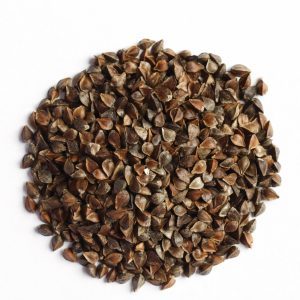
- inexpensive and affordable, especially in regions where buckwheat is grown and processed;
- easy to deliver;
- has undergone thermal treatment, therefore it does not contain fungi, bacteria, viruses, pests and is safe for soil and plants;
- easy to use;
- effective.
A significant amount of material is required to obtain a noticeable result on large areas.
What plants are suitable for
It is useful to add buckwheat husks to the soil, as well as fertilizers and dressings based on it, when growing crops:
- almost all decorative flowers and shrubs (zinnias, cineraria, etc.);
- vegetable - tomatoes, cucumbers, cabbage, etc.;
- fruit and berry - raspberries, strawberries, currants.
Buckwheat husk fertilizers have a beneficial effect on various crops grown at home, in greenhouses and in the open field. Buckwheat husk is especially useful for plants that do not like acidic soils.
Attention! Use buckwheat hulls with caution on plants that prefer acidic soils.
Buckwheat husk application in the garden
Experienced farmers have been experimenting with organic waste for a long time, using it to improve the soil and growing conditions of plants. Husk is used in the garden in the following ways:
- for mulching;
- as fertilizer;
- for introduction into the ground;
- composting.
Due to the hardness and long decomposition period, buckwheat husks are inappropriate to use for the preparation of fertilizing infusions and solutions.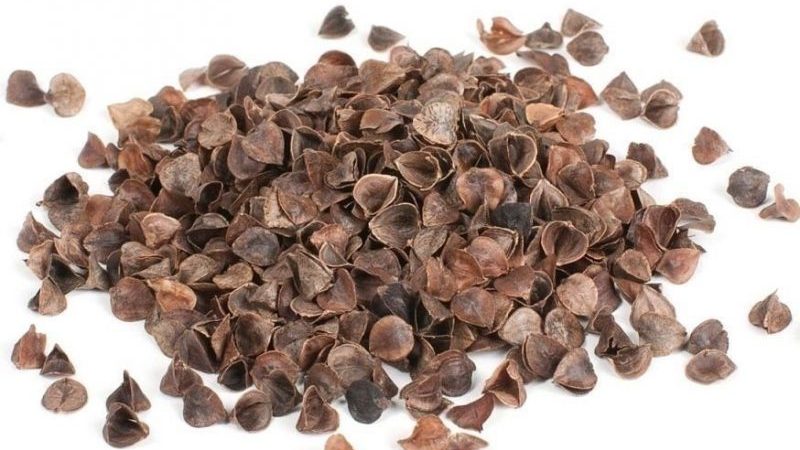
Mulching
As a mulching layer, buckwheat husk has many beneficial properties:
- well ventilated, without obstructing the access of air to the roots of plants;
- perfectly retains moisture in the soil, weakening its evaporation from the surface;
- reduces fluctuations in daily temperature;
- promotes soil warming in cold weather,
- protects against overheating in hot climates;
- saves underground parts of perennial plants (roots, buds) from winter cold;
- inhibits the germination of weeds;
- prevents crust formation on the soil surface.
An additional effect is decorativeness: the husk layer covers the bare ground and gives the plantings a natural and at the same time well-groomed appearance.
The listed qualities have a positive effect on soil fertility, growth and development of cultivated plants. Labor and time costs for planting processing are significantly reduced.
Depending on the amount of material and the purposes of its use, husk mulching is performed in the following ways:
- continuous coverage of large areas of land;
- inter-row;
- point.
To create a mulch layer, it is enough to place a layer of husk with a thickness of 2-3 cm on the selected soil area.
The disadvantages of husk as a mulching layer include its lightness and "volatility". It is best to use this material when growing plants in greenhouses (greenhouses, greenhouses). In open areas, even with light wind or rain, most of the coating will scatter or wash away.
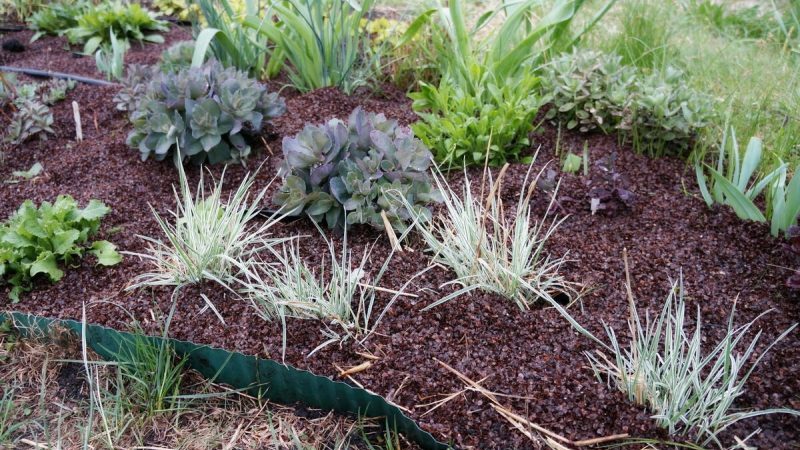
Attention. Buckwheat husk is an excellent insulator that keeps the soil in the same state in which it was during mulching. It is recommended to cover the soil with it when the soil surface is most suitable for active plant growth, that is, it is warmed up and moist.
As fertilizer
Experts appreciate buckwheat husk as an alkaline potash fertilizer that nourishes the soil and reduces its acidity. Hulls also have other useful properties.
Its chemical composition includes ash (1.49%), containing the following elements and compounds:
- phosphorus - 0.036%;
- iron oxide - 1.3%;
- calcium oxide - 50.04%;
- potassium oxide - 19.7 %%
- sodium oxide - 3.91%;
- magnesium oxide - 3.1%;
And although the husk contains much less useful components than grains, this amount is quite enough for many agricultural plants.
On the basis of this natural material, modern complex slow-acting fertilizers have been developed that provide:
- active plant growth, especially at the beginning of development;
- increasing stress resistance of heat-loving crops.
It is not necessary to buy ready-made fertilizers to increase soil fertility. Affordable and inexpensive husk does an excellent job.
The main ways to use this fertilizer:
- introduction into the soil during its digging in spring and autumn or directly into the planting holes before planting plants;
- composting together with other organic residues and further use in compost;
- embedding in the top layer of the earth around the plants.
Read also:
Soil application
The introduction of buckwheat husks into the ground during digging has a beneficial effect on its composition and structure:
- heavy clay soils become looser ("fluffy") and air-intensive;
- in sandy soil, due to the binding properties of the husk, the moisture content increases.
Additional benefits of applying husk to the ground:
- enrichment with mineral elements and organic compounds;
- the release of natural growth stimulants as a result of the decomposition of organic components, which makes the nutrients in the substrate more accessible to plants;
- prevention of many diseases developing due to poor soil quality;
- creation of a breeding ground for earthworms, actively working the soil and making it more fertile and loose.
Relatively small volumes of potting soil mixtures using husk (for example, for seedlings or pot crops) are prepared in a ratio of 75% peat and 25% husk.
Reference. Scientists have shown that adding husk to the soil when growing tomatoes increases their yield by an average of 11% and increases resistance to diseases.
Composting
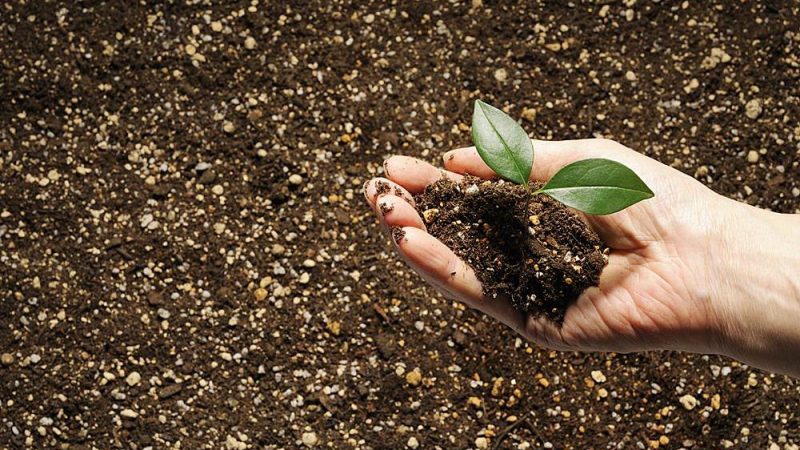
An excellent way to get nutrient soil, which is consumed as needed:
- for feeding;
- mulching;
- growing seedlings and especially valuable crops.
For composting, buckwheat husks and other organic waste (grass, foliage, plant residues, etc.) are placed in a spacious container, having layers 10 cm thick and sprinkling with earth. It is better to keep the container in the shade.
The compost is watered periodically - it is important to keep it moist... It is useful to add compounds and preparations that stimulate decomposition processes. During decomposition, the mass decreases in volume, which makes it possible to gradually enrich the compost with organic materials. It will be fully ready in 2-3 years depending on climate and weather conditions.
Reference. If the husk is used as the main material for compost, manure or dung is added to it to replenish nitrogen. When the husk is decomposed, it is consumed in large quantities.
Tips and tricks from experienced gardeners
Buckwheat husk is becoming more and more popular with experienced gardeners. It is used both in pure form and in combination with other fertilizers:
- Plowing husks together with green green manure will help to increase soil fertility.
- The specific buckwheat smell characteristic of the husk drives away the cabbage fly. To get rid of an insect, it is enough to mulch cabbage plantings with husks.
- Buckwheat husk is dense and moisture-consuming. It is important to take this into account when watering plants mulched with it. Moisture will only penetrate into the ground if the husk is properly spilled, otherwise the ground under the mulch will remain dry.
Read also:
What the body lacks if you constantly want buckwheat.
Conclusion
Buckwheat husk is a versatile material for agricultural work, in demand among experienced gardeners and gardeners. It benefits most crops and is applicable in all climates. Husk is inexpensive, facilitates the manual labor of farmers, and the methods of its use are varied.
Reviews of husk are unanimous: its use in agriculture increases soil fertility and activates the growth and development of agricultural crops.